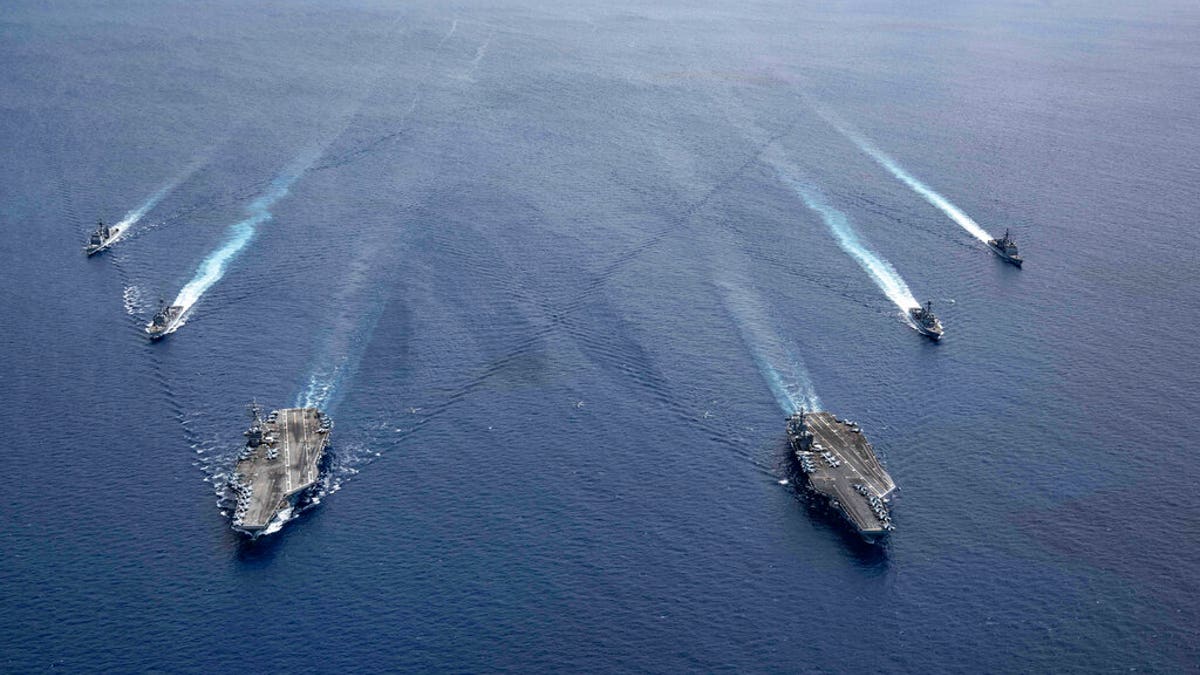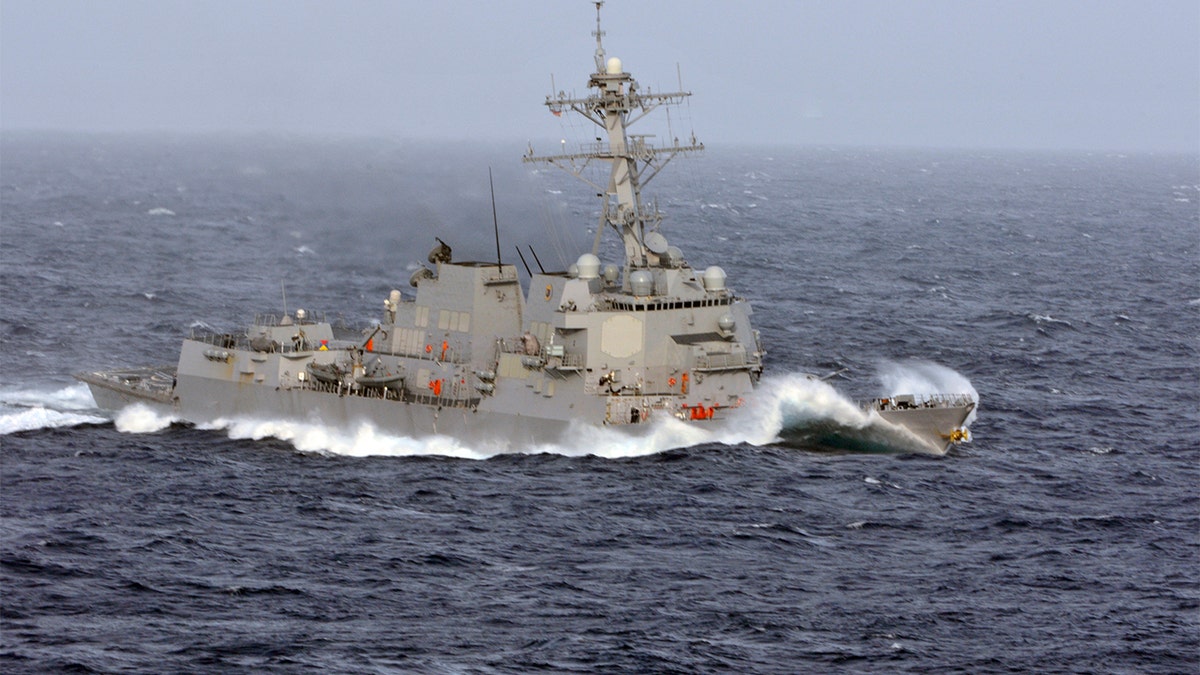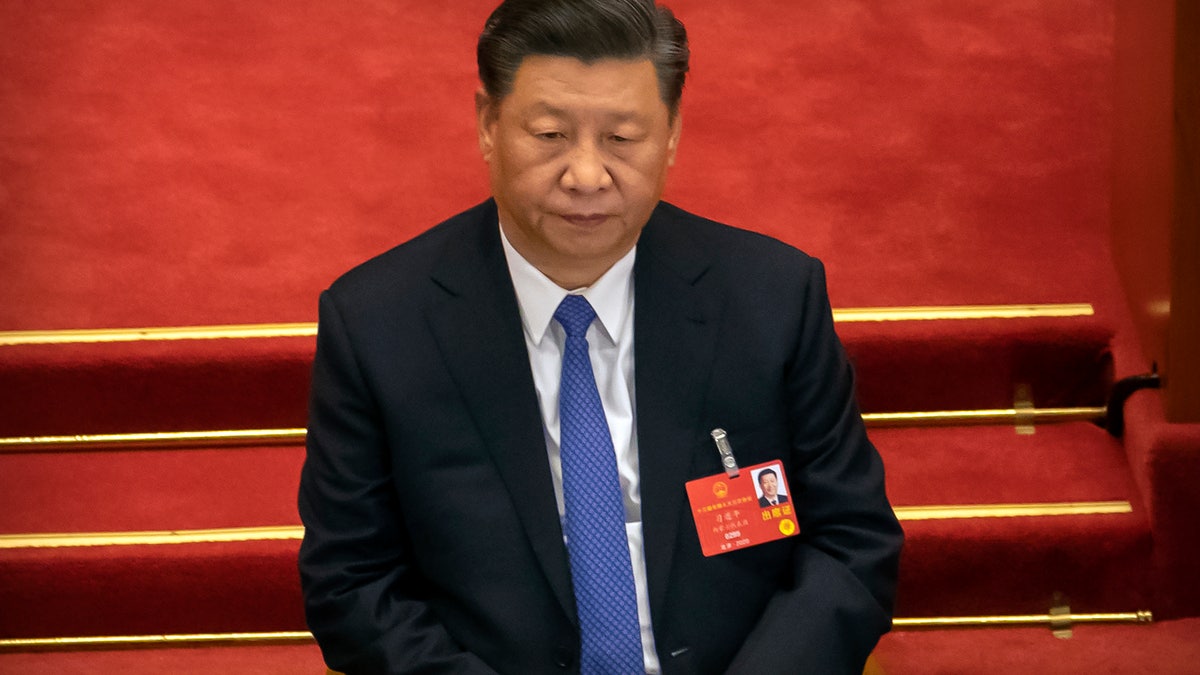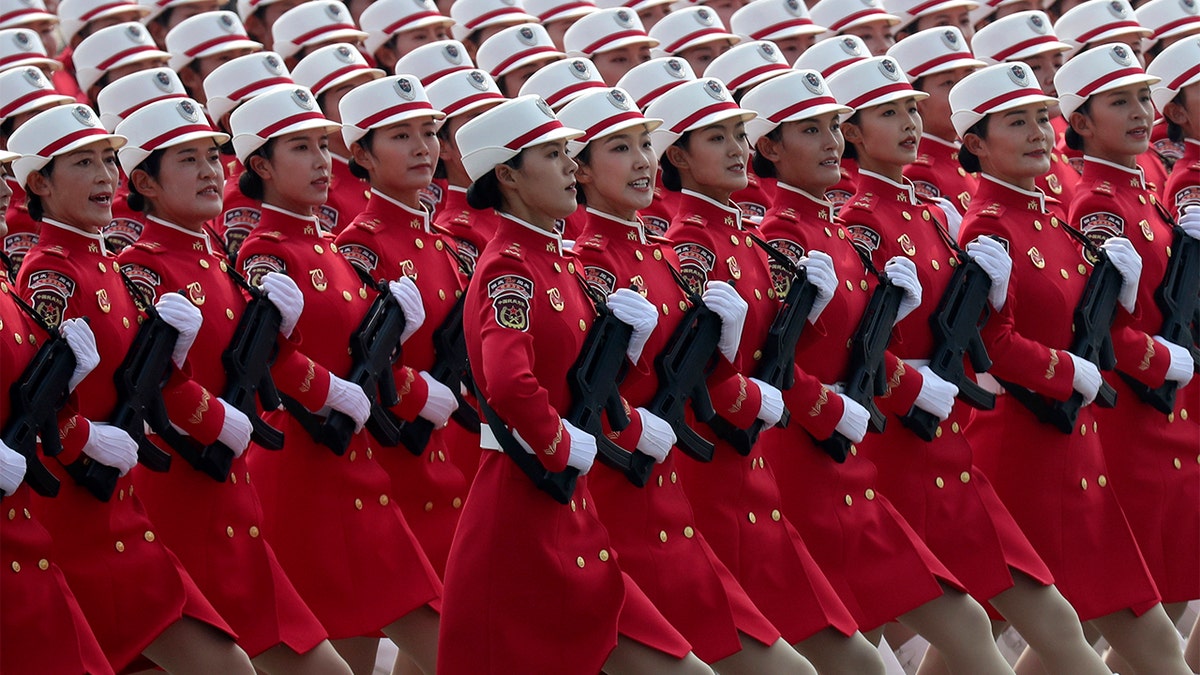The United States and China have long been at odds over maritime freedom in the South China Sea, but this week marked the first time that Washington made an official policy shift to clamp down on Beijing's activity – calling it "illegal" and thus opening the legal floodgates to a potential military response.
On Monday, Secretary of State Mike Pompeo said in a statement that the U.S. is "making clear: Beijing's claims to offshore resources across most of the South China Sea are completely unlawful, as is its campaign of bullying to control them."
"Beijing uses intimidation to undermine the sovereign rights of Southeast Asian coastal states in the South China Sea, bully them out of offshore resources, assert unilateral dominion, and replace international law with 'might makes right.' Beijing's approach has been clear for years," he continued. "The People's Republic of China (PRC) has no legal grounds to unilaterally impose its will on the region."
CHINA ACCUSES US OF 'INCITING CONFRONTATION’ IN SOUTH CHINA SEA

In this photo provided by U.S. Navy, the USS Ronald Reagan (CVN 76) and USS Nimitz (CVN 68) Carrier Strike Groups steam in formation, in the South China Sea, Monday, July 6, 2020. China on Monday, July 6, accused the U.S. of flexing its military muscles in the South China Sea by conducting joint exercises with two U.S. aircraft carrier groups in the strategic waterway.(Mass Communication Specialist 3rd Class Jason Tarleton/U.S. Navy via AP)
Pompeo underscored that Beijing has offered no coherent legal basis for its "Nine-Dashed Line" claim in the South China Sea since formally announcing it in 2009.
In a unanimous decision on July 12, 2016, an Arbitral Tribunal constituted under the 1982 Law of the Sea Convention – to which the PRC is a state party – rejected the PRC's maritime claims as having no basis in international law. The tribunal sided squarely with the Philippines, which brought the arbitration case on almost all claims.
At the time, Assistant Secretary of State for East Asia, David Stilwell, cautioned that Washington could double-down further with sanctions against Chinese officials and businesses involved in maligned South China Sea activity, vowing that the U.S. would "no longer stay neutral on these maritime issues."
Zack Cooper, a fellow at the American Enterprise Institue (AEI), told Fox News that the legal statements by the U.S. make it clear that it views "most Chinese maritime claims and activities in the South China Sea as illegal."
"Making this explicit opens the door to further U.S. moves to penalize destabilizing Chinese behavior, particularly its interference with fishing and oil and gas exploration by the other regional claimants, most notably the Philippines, Vietnam, Malaysia, Brunei, and Indonesia," he continued.
STATE DEPARTMENT IMPOSES SANCTIONS ON EMPLOYEES OF CHINESE TECH COMPANIES, INCLUDING HUAWEI
While the U.S. policy has in the past condemned China's territorial claims and expansion endeavors in and around the vital body of water, of which some $3 trillion worth of trade passes through annually, it has always called for disputes to be peacefully resolved by regional players. However, analysts note that the wording this week veers into outright rejection and puts the U.S. squarely at the center of the conflict.

The guided-missile destroyer USS Wayne E. Meyer (DDG 108) is underway in the South China Sea as part of the George Washington Carrier Strike Group. (U.S. Navy photo by Mass Communication Specialist Seaman Justin E. Yarborough/Released)
To further cap off the seriousness of the situation and demonstrate a commitment to freedom of navigation, the U.S. warship Ralph Johnson also muscled through the territorially challenged waters on Tuesday.
The South China Sea is home to pivotal shipping arteries, billions of barrels of oil and trillions of cubic feet of natural gas deposits and lucrative fisheries. It is dotted with contested islands and reefs, which are also vital to accessing these resources, and are routinely claimed by other countries, including Malaysia, the Philippines, and Vietnam.
"It also serves as one of the world's most important trade routes, with about 30 percent of maritime trade flowing through the area annually. This is largely why the U.S. government advocates so strongly for freedom of navigation throughout the area – to deny China with an opportunity to potentially be in control of such an important waterway," noted Craig Singleton, adjunct fellow and an expert on China at the Foundation for the Defense of Democracies (FDD).
However, for more than a decade, the PRC leadership has become increasingly more aggressive in its centuries-old proclamations that the region belongs to them – and has gone on to bolster its military presence there and commands that its vessels have freedom of movement.
In addition, Beijing has been busily building everything from defense locations such as hangars, bunkers, and runways to tourist resorts, schools, and modern apartments to farms, banks, hospitals, and communications capabilities.

Chinese President Xi Jinping attends the closing session of China's National People's Congress in Beijing in May. (AP)
Moreover, Beijing has steadily re-settled local fishing communities and sent citizens to the region. In January 2019, the China Academy of Sciences even opened its doors to the "Oceanographic Research Centre" on Mischief Reef. In April this year, Beijing declared two more administrative districts.
HOW MUCH OF THE UNITED STATES DOES CHINA REALLY OWN?
Earlier this month, the Communist leadership ignited further fury by sealing off a section of the waterways to conduct naval drills. Ultimately, the region is an essential part of China's "Greater Bay Area economic development" plan, and since 2012 has been intent on populating a number of islands.
"China would like to control all of the South China Sea, including its oil, gas, and fishing resources," Cooper conjectured. "That puts it in conflict, however, with the U.N. Convention on the Law of the Sea, which makes clear that China has only limited rights to the maritime zones in the South China Sea."
And with much of the world distracted by the fallout of the coronavirus pandemic – which originated in the Chinese city of Wuhan last year – the PRC's activities in the waterways have only escalated in recent months, analysts conclude. Chinese barges have been accused of pursuing Malaysian oil-exploration boats, and at one point, slamming a Vietnamese-flagged fishing boat.
"China has steadily engaged in land reclamation and construction of military outposts throughout the South China Sea, even going so far as to install surface-to-air missiles, jamming equipment, and anti-ship missiles on some of these outposts," Singleton continued. "China undertook these activities in violation of international law and in spite of a 2015 promise by Chinese President Xi Jinping to then-President Barack Obama that he would not militarize the area."

Members of a Chinese military honor guard march during the celebration to commemorate the 70th anniversary of the founding of Communist China in Beijing, Tuesday, Oct. 1, 2019. (AP Photo/Ng Han Guan)
It remains to be seen just how far Washington is willing to go to curb China's "unlawful" maneuvers.
Earlier this month, the U.S. deployed two aircraft carrier strike groups – the USS Nimitz and USS Ronald Reagan – for joint operations in the South China Sea. Moreover, there is the P8-Poseidon Maritime Patrol Aircraft that traversed the sea, along with the U.S. Air Force's B-52 strategic bomber – all while China was conducting its own training nearby. The U.S. Navy is known to have undertaken at least six such operations throughout the first half of 2020 alone.
China's Ministry of Foreign Affairs predictably dismissed Pompeo's stinging words on Monday, calling them "irresponsible" and a distortion of international law that "deliberately stokes territorial and maritime disputes, and undermines regional peace and stability."
It also took aim at the U.S. military presence earlier this month with a state media outlet tweeting that "any U.S. #aircraftcarrier movement in the region is at the pleasure" of the Chinese military.
CLICK HERE TO GET THE FOX NEWS APP
But despite the ratcheting up of tensions this week – and the subsequent spurring of speculation that conflict could erupt at any moment in the resource-rich waterway – most experts assert that we are still far from an all-out brawl between the two superpowers.
"A war or other military conflict appears highly unlikely at this time," Singleton added. "Although tensions will likely continue to escalate as the U.S. publicly challenges China's sovereignty claims over the region and its ongoing efforts to threaten other countries, including Vietnam."








































